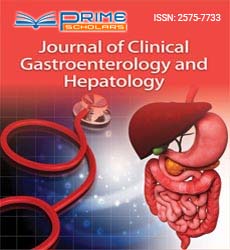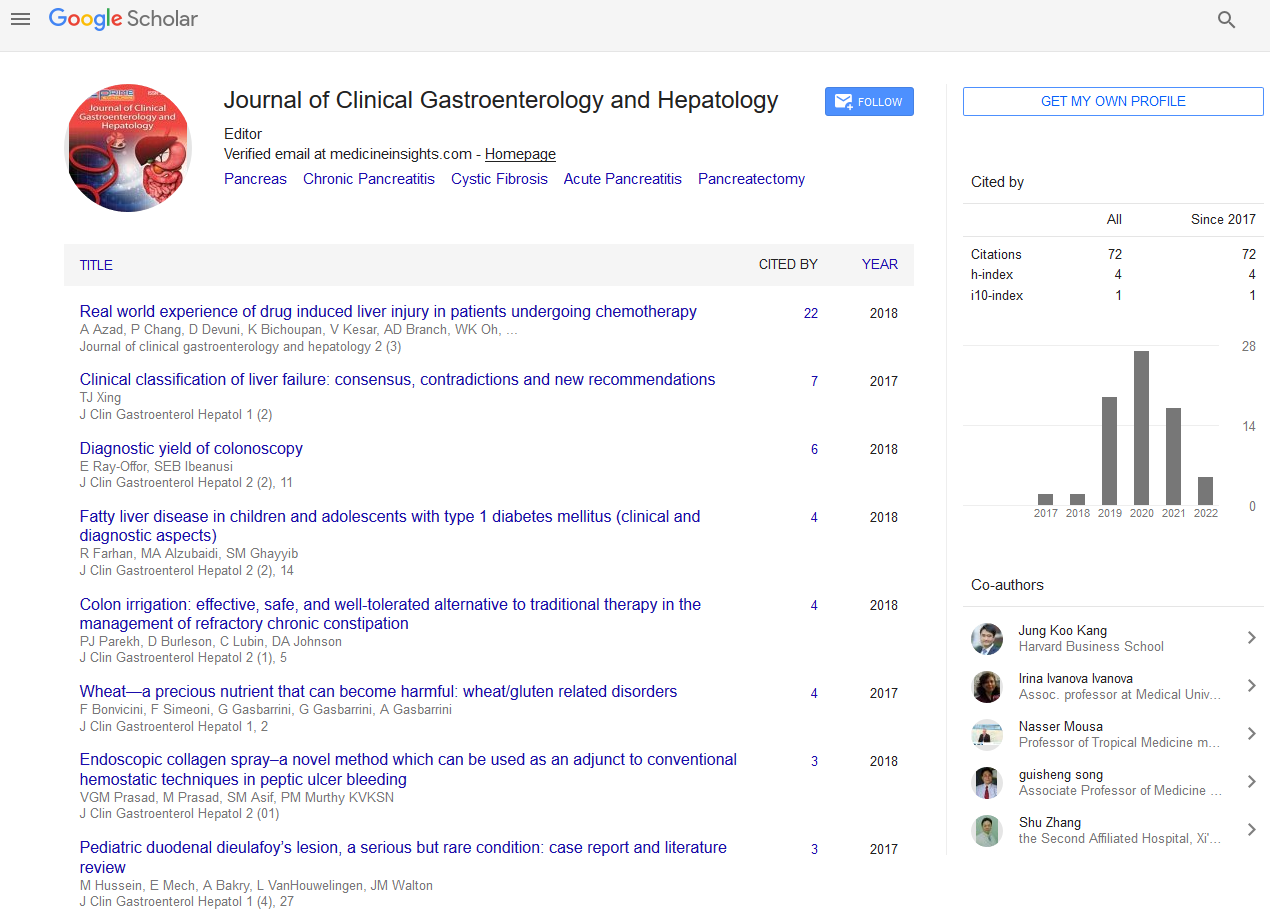Commentary - (2024) Volume 8, Issue 6
Gastrointestinal Cancer: Early Detection, Treatment Advances, and Preventive Measures
Stefan Andreas*
Department of Hepatology, University of Pennsylvania Perelman School of Medicine, Malaysia
*Correspondence:
Stefan Andreas,
Department of Hepatology, University of Pennsylvania Perelman School of Medicine,
Malaysia,
Email:
Received: 02-Dec-2024, Manuscript No. IPJCGH-25-22569;
Editor assigned: 04-Dec-2024, Pre QC No. IPJCGH-25-22569 (PQ);
Reviewed: 18-Dec-2024, QC No. IPJCGH-25-22569;
Revised: 23-Dec-2024, Manuscript No. IPJCGH-25-22569 (R);
Published:
30-Dec-2024, DOI: 10.36648/2575-7733.8.6.55
Description
Gastrointestinal (GI) disorders are a group of medical
conditions that affect the digestive system, causing discomfort
and impacting the ability to process food properly. The
gastrointestinal system is a complex network involving various
organs such as the stomach, intestines, liver, pancreas, and
gallbladder, which work in tandem to digest food, absorb
nutrients, and eliminate waste. Disruptions in any of these
organs can lead to GI disorders, which can range from mild,
transient issues like indigestion to more severe and chronic
conditions such as Inflammatory Bowel Disease (IBD) or
gastrointestinal cancer. This article explores the most common
types of gastrointestinal disorders, their symptoms, causes,
diagnosis, and treatments. Gastroesophageal reflux disease,
or GERD, is a common condition where stomach acid or bile
irritates the lining of the oesophagus. GERD occurs when the
Lower Oesophageal Sphincter (LES), which normally prevents
stomach contents from flowing back into the oesophagus,
becomes weakened or relaxes abnormally. This results in acid
reflux, causing symptoms such as heartburn, regurgitation,
chest pain, difficulty swallowing, and a sour taste in the mouth.
If left untreated, GERD can lead to more serious complications
such as oesophageal ulcers, narrowing of the oesophagus,
or even oesophageal cancer. Irritable Bowel Syndrome is a
functional GI disorder characterized by symptoms such as
abdominal pain, bloating, constipation, and diarrhoea. The
exact cause of IBS is not well understood, but it is believed
to be related to abnormal muscle contractions in the colon,
heightened sensitivity to digestive processes, or imbalances
in the gut microbiota. While IBS is a chronic condition, its
symptoms can be managed through dietary changes, stress
management, and medications such as antispasmodics, fiber
supplements, and antidepressants. Inflammatory Bowel
Disease is an umbrella term for chronic inflammatory conditions
of the GI tract, primarily Crohnâ??s disease and ulcerative colitis.
Crohnâ??s disease can affect any part of the GI tract, from the
mouth to the anus, while ulcerative colitis is confined to the
colon and rectum. Both conditions cause symptoms such as
abdominal pain, diarrhoea, weight loss, fatigue, and rectal
bleeding. The exact cause of IBD is not fully understood, but it
is thought to involve a combination of genetic factors, immune
system dysfunction, and environmental triggers. Treatment for
IBD includes anti-inflammatory drugs, immunosuppressants,
biologics, and in some cases, surgery to remove affected parts
of the digestive tract. Celiac disease is an autoimmune disorder
in which the ingestion of gluten, a protein found in wheat,
barley, and rye, triggers an immune response that damages
the lining of the small intestine. This damage impairs nutrient
absorption, leading to malnutrition, diarrhoea, weight loss,
bloating, and fatigue. Over time, untreated celiac disease can
result in serious complications such as osteoporosis, infertility,
and neurological disorders. The only effective treatment for
celiac disease is a strict, lifelong gluten-free diet, which allows
the intestine to heal and alleviates symptoms. Infections of the
gastrointestinal tract can be caused by a variety of pathogens,
including bacteria, viruses, and parasites. Common symptoms
of GI infections include diarrhoea, vomiting, abdominal
cramps, fever, and dehydration. Some of the most well-known
infections include those caused by Salmonella, Escherichia coli,
Norovirus, and Rotavirus.
Acknowledgement
None.
Conflict Of Interest
The author's declared that they have no conflict of interest.
Citation: Andreas S (2024) Gastrointestinal Cancer: Early Detection, Treatment Advances, and Preventive Measures. J Clin Gastroenterol Hepatol. 8:55.
Copyright: © 2024 Andreas S. This is an open-access article distributed under the terms of the Creative Commons Attribution License, which permits unrestricted use, distribution, and reproduction in any medium, provided the original author and source are credited.

